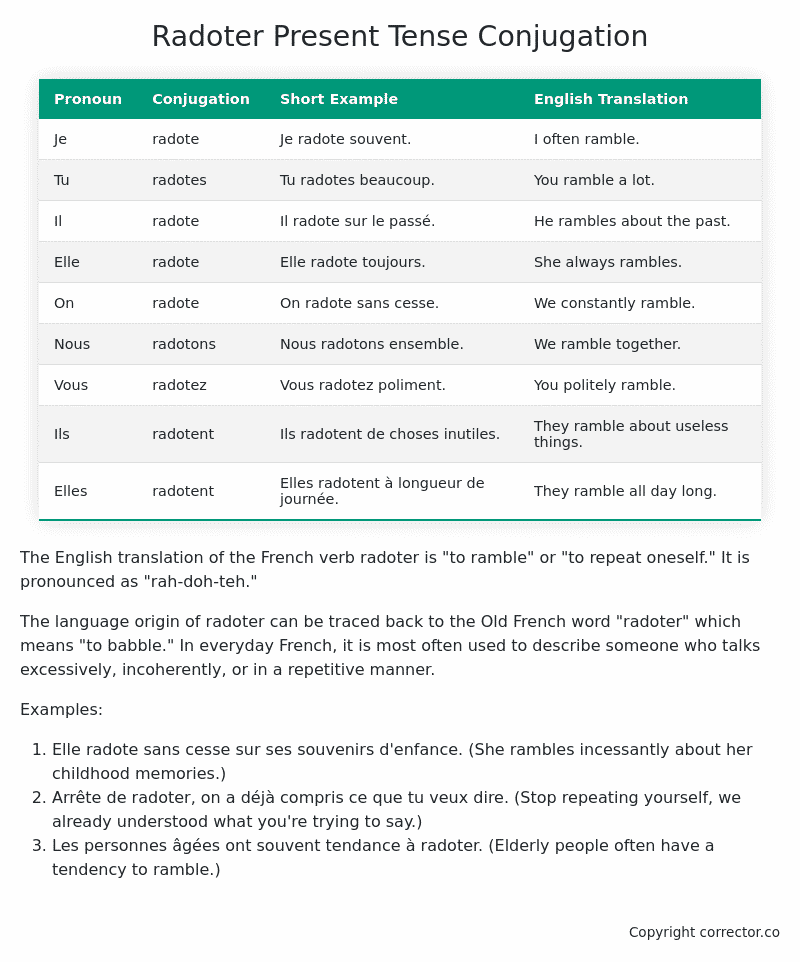Le Present (Present Tense) Conjugation of the French Verb radoter
Introduction to the verb radoter
The English translation of the French verb radoter is “to ramble” or “to repeat oneself.” It is pronounced as “rah-doh-teh.”
The language origin of radoter can be traced back to the Old French word “radoter” which means “to babble.” In everyday French, it is most often used to describe someone who talks excessively, incoherently, or in a repetitive manner.
Examples:
- Elle radote sans cesse sur ses souvenirs d’enfance. (She rambles incessantly about her childhood memories.)
- Arrête de radoter, on a déjà compris ce que tu veux dire. (Stop repeating yourself, we already understood what you’re trying to say.)
- Les personnes âgées ont souvent tendance à radoter. (Elderly people often have a tendency to ramble.)
Radoter – About the French Present Tense
To take a deep dive into all the French tenses then see our article on Mastering French Tense Conjugation.
Common Everyday Usage Patterns For Le Present
Interactions with Other Tenses
Table of the Present Tense Conjugation of radoter
| Pronoun | Conjugation | Short Example | English Translation |
|---|---|---|---|
| Je | radote | Je radote souvent. | I often ramble. |
| Tu | radotes | Tu radotes beaucoup. | You ramble a lot. |
| Il | radote | Il radote sur le passé. | He rambles about the past. |
| Elle | radote | Elle radote toujours. | She always rambles. |
| On | radote | On radote sans cesse. | We constantly ramble. |
| Nous | radotons | Nous radotons ensemble. | We ramble together. |
| Vous | radotez | Vous radotez poliment. | You politely ramble. |
| Ils | radotent | Ils radotent de choses inutiles. | They ramble about useless things. |
| Elles | radotent | Elles radotent à longueur de journée. | They ramble all day long. |
Other Conjugations for Radoter.
Le Present (Present Tense) Conjugation of the French Verb radoter (this article)
Imparfait (Imperfect) Tense Conjugation of the French Verb radoter
Passé Simple (Simple Past) Tense Conjugation of the French Verb radoter
Passé Composé (Present Perfect) Tense Conjugation of the French Verb radoter
Futur Simple (Simple Future) Tense Conjugation of the French Verb radoter
Futur Proche (Near Future) Tense Conjugation of the French Verb radoter
Plus-que-parfait (Pluperfect) Tense Conjugation of the French Verb radoter
Passé Antérieur (Past Anterior) Tense Conjugation of the French Verb radoter
Futur Antérieur (Future Anterior) Tense Conjugation of the French Verb radoter
Subjonctif Présent (Subjunctive Present) Tense Conjugation of the French Verb radoter
Subjonctif Passé (Subjunctive Past) Tense Conjugation of the French Verb radoter
Subjonctif Imparfait (Subjunctive Imperfect) Tense Conjugation of the French Verb radoter
Subjonctif Plus-que-parfait (Subjunctive Pluperfect) Tense Conjugation of the French Verb radoter
Conditionnel Présent (Conditional Present) Tense Conjugation of the French Verb radoter
Conditionnel Passé (Conditional Past) Tense Conjugation of the French Verb radoter
L’impératif Présent (Imperative Present) Tense Conjugation of the French Verb radoter
L’infinitif Présent (Infinitive Present) Tense Conjugation of the French Verb radoter
Struggling with French verbs or the language in general? Why not use our free French Grammar Checker – no registration required!
Get a FREE Download Study Sheet of this Conjugation 🔥
Simply right click the image below, click “save image” and get your free reference for the radoter Present Tense tense conjugation!

I hope you enjoyed this article on the verb radoter. Still in a learning mood? Check out another TOTALLY random French verb present conjugation!


